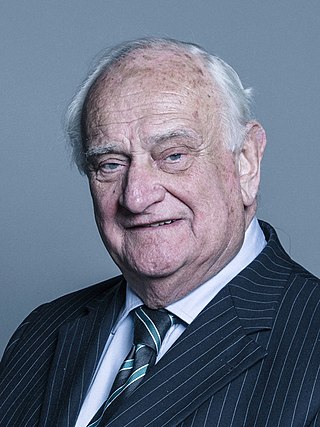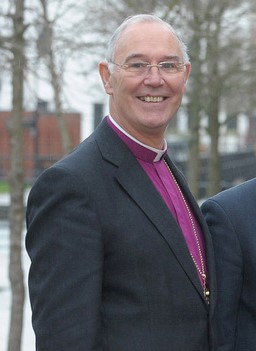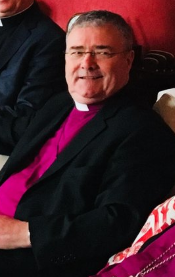| |||||
| Centuries: | |||||
|---|---|---|---|---|---|
| Decades: | |||||
| See also: | Other events of 1708 List of years in Ireland | ||||
Events from the year 1708 in Ireland.
| |||||
| Centuries: | |||||
|---|---|---|---|---|---|
| Decades: | |||||
| See also: | Other events of 1708 List of years in Ireland | ||||
Events from the year 1708 in Ireland.

County Armagh is one of the six counties of Northern Ireland and one of the traditional thirty-two counties of Ireland. It is located in the province of Ulster and adjoins the southern shore of Lough Neagh. It borders the Northern Irish counties of Tyrone to the west and Down to the east. The county borders Louth and Monaghan to the south and southwest, which are in the Republic of Ireland. It is named after its county town, Armagh, which derives from the Irish Ard Mhacha, meaning "Macha's height". Macha was a sovereignty goddess in Irish mythology and is said to have been buried on a wooded hill around which the town of Armagh grew. County Armagh is colloquially known as the "Orchard County" because of its many apple orchards.

The Church of Ireland is a Christian church in Ireland, and an autonomous province of the Anglican Communion. It is organised on an all-Ireland basis and is the second-largest Christian church on the island after the Roman Catholic Church. Like other Anglican churches, it has retained elements of pre-Reformation practice, notably its episcopal polity, while rejecting the primacy of the pope.
The Lord High Chancellor of Ireland was the highest judicial office in Ireland until the establishment of the Irish Free State in 1922. From 1721 to the end of 1800, it was also the highest political office of the Irish Parliament: the Chancellor was Speaker of the Irish House of Lords. The Lord Chancellor was also Lord Keeper of the Great Seal of Ireland. In all three respects, the office mirrored the Lord High Chancellor of Great Britain.

The Belfast Royal Academy is the oldest school in the city of Belfast, Northern Ireland. It is a co-educational, non-denominational voluntary grammar school in north Belfast. The Academy is one of 8 schools in Northern Ireland whose Head is a member of the Headmasters' and Headmistresses' Conference.

Robert Henry Alexander Eames, Baron Eames, is an Anglican bishop and life peer, who served as Primate of All Ireland and Archbishop of Armagh from 1986 to 2006.

Oliver Plunkett was the Catholic Archbishop of Armagh and Primate of All Ireland and the last victim of the Popish Plot. He was beatified in 1920 and canonised in 1975, thus becoming the first new Irish saint in almost seven hundred years.

John Bramhall, DD was an Archbishop of Armagh, and an Anglican theologian and apologist. He was a noted controversialist who doggedly defended the English Church from both Puritan and Roman Catholic accusations, as well as the materialism of Thomas Hobbes.

The Royal School is a mixed boarding school located in Dungannon, County Tyrone, Northern Ireland. It was one of a number of 'free schools' created by James I in 1608 to provide an education to the sons of local merchants and farmers during the plantation of Ulster. Originally set up in Mountjoy near Lough Neagh in 1614, it moved to its present location in 1636. It was founded as a boys school but became coed in 1986 when the school amalgamated with the Dungannon High School for Girls. It has four 'sister' schools, The Royal School, Armagh in Armagh, County Armagh, The Enniskillen Royal Grammar School in Enniskillen, County Fermanagh, The Royal School Cavan in County Cavan, and the Royal and Prior School in Raphoe, County Donegal. The original intention had been to have a "Royal School" in each of Ireland's counties but only five were actually established, the schools planned for other counties never coming into being.

Alan Edwin Thomas Harper, is a retired Anglican bishop. He served in the Church of Ireland as Archbishop of Armagh and Primate of All Ireland from 2007 to 2012.
Events from the year 1794 in Ireland.
Events from the year 1686 in Ireland.
Events from the year 1680 in Ireland.
William Reeves was an Irish antiquarian and the Church of Ireland Bishop of Down, Connor and Dromore from 1886 until his death. He was the last private keeper of the Book of Armagh and at the time of his death was President of the Royal Irish Academy.

Charles Frederick D'Arcy was a Church of Ireland bishop. He was the Bishop of Clogher from 1903 to 1907 when he was translated to become Bishop of Ossory, Ferns and Leighlin before then becoming the Bishop of Down, Connor and Dromore. He was then briefly the Archbishop of Dublin and finally, from 1920 until his death, Archbishop of Armagh. He was also a theologian, author and botanist.
John Parker was a Church of Ireland clergyman who came to prominence after the English Restoration, first as Bishop of Elphin, then as Archbishop of Tuam and finally as Archbishop of Dublin and Primate of Ireland.
Thomas Lancaster was an English Protestant clergyman, Church of Ireland Archbishop of Armagh from 1568.
Thomas Lindsay, D.D., B.D., M.A (1656–1724) was an Anglican clergyman who served in the Church of Ireland as the Dean of St. Patrick's Cathedral, Dublin, Bishop of Killaloe, Bishop of Raphoe and finally Archbishop of Armagh.

Francis John McDowell is an Anglican bishop, who is the current Church of Ireland Archbishop of Armagh and Primate of All Ireland.
Events from the year 1613 in Ireland.
Events from the year 1552 in Ireland.
{{cite web}}: CS1 maint: unfit URL (link)